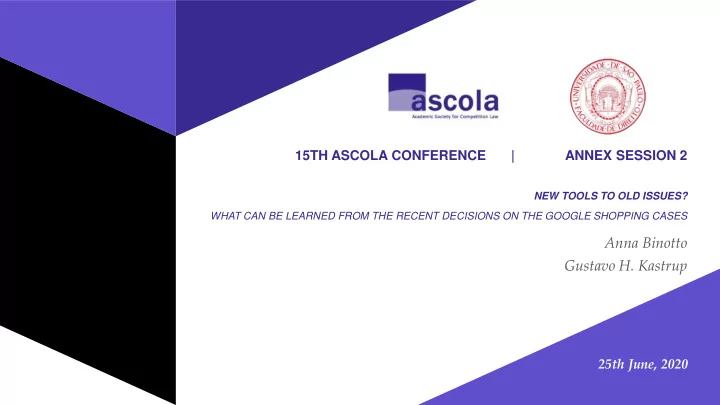

15TH ASCOLA CONFERENCE | ANNEX SESSION 2 NEW TOOLS TO OLD ISSUES? WHAT CAN BE LEARNED FROM THE RECENT DECISIONS ON THE GOOGLE SHOPPING CASES Anna Binotto Gustavo H. Kastrup 25th June, 2020
AGENDA 1 INTRODUCTION 2 GOOGLE SHOPPING AROUND THE GLOBE 3 CONCLUSIONS 4 6
1 INTRODUCTION Research problems & methodology
INTRODUCTION Research problems & methodology Tech platforms and online What is the difference in retail the analysis of EU, US and Brazil? Giants as Google and Amazon involved in the online retail business. Commitments in the US, high fines imposed by EC and case Google Shopping : tool to influence in this closed by CADE. Market. Would Google Shopping be Comparison among these an antitrust problem? different approaches. New mechanisms in the retail sector. Influence of price comparison websites and search browsers in consumer behavior. 4
2 GOOGLE SHOPPING AROUND THE GLOBE Decisions in the US, EU and Brazil
GOOGLE SHOPPING ANALYSIS FTC approach Search bias, scraping, exclusivity: the whole lot of infractions FTC analysis contrasted the possible harm to competition due to Google ’ s Market power with incentives to innovation. Conclusion: no harmful conduct. Aftermath: commitments and case closed Google agreed to change some of its business practices and FTC closed the case. 6
GOOGLE SHOPPING ANALYSIS European Commission takes the lead Google ’ s dominance in the Leverage: the (truthfully affected markets contested) theory of harm • High market shares in both upstream • Discussions on what would be the and downstream markets (search conduct: a new practice? browsers and price comparison websites) • Google would have leveraged its position in the market for search • Network effects between Google ’ s browsers to obtain advantages in the activities in both markets downstream market • Capacity to foreclose the market • downstream market (access via Google Again: bottleneck effects to foreclose Search and bottleneck effects) the market Image: Emmanuel Dunand/AFP via Getty Images 7
GOOGLE SHOPPING ANALYSIS CADE ’ s foggy assessment Technical analysis: dismissal of Tribunal: confirmation of GS ’ s the case decision Long time of analysis: 7 years within CADE ’ s Following GS ’ s decision, the majority of technical body (the General-Superintendence) CADE ’ s Tribunal dismissed the case concluding that would be no harm to The harm to competitors would have been caused competition by Google ’ s innovations. CADE protect consumers, not competitors Divergent decision: following the EC ’ s approach, three of seven Commissioners No effective harm to competition pointed out the leverage of Google ’ s dominant position in the upstream market (search browsers) to the downstream market (price comparison websites) 8
3 CONCLUSIONS
NEW ISSUES, BUT, IN COMPETITION IN FACT, THE SAME DIGITAL MARKETS USEFUL OLD TOOLS • In digital markets, conducts have • Certain intermediary agents (perhaps platforms) from different sides could have changed - the way of facing them been said to reach a certain degree of must accompany this change - but dominance in their core markets, in such a this does not mean that traditional way that they no longer act exclusively as mere intermediation agents, but rather antitrust analysis tools must be become true regulators through leveraging abandoned market power. • More important than running in • Aside from profiting from their usual and circles, authorities should direct their core activities, the accumulated economic efforts to comprehend the changes in power of these agents can lead them to act as true lawmakers the competitive dynamics of each sector in the face of digitalization • In the Google Shopping case, data • Although designed for other contexts, collection was able to give the dominant agent the possibility of almost foreclosing traditional antitrust tools can be access to its competitors in an adjacent replicable and perfectly employed in market, making leverage even more new contexts sensitive and advantageous..
[Google ’ s] misconduct lasted over 10 years and denied other companies the possibility to compete on the merits and to innovate - and consumers the benefits of competition Margrethe Vestager
THANK YOU! Anna Binotto anna.massaro@usp.br Gustavo H. Kastrup gustavo.Kastrup@usp.br
Recommend
More recommend